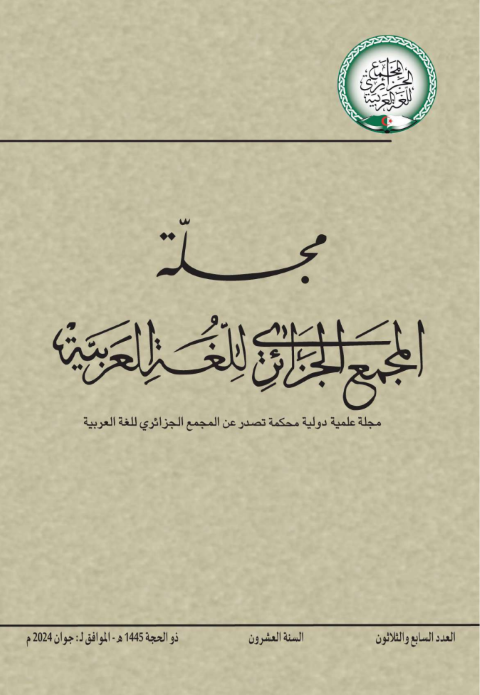الكتابة والتواصل من دلالة الوضع إلى دلالة الإيحاء
DOI:
https://doi.org/10.70443/jaaal.v20i1.283الكلمات المفتاحية:
الكتابة، اللغة، الفهم، المعنى، التأويل، الهوية، الثقافةالملخص
كلُّ تواصل لساني هو محاولة لتأسيس مبدأ إنساني مُعلّل يسعى إلى إخراج الفرد من عزلته، ودمجه قسرا في شبكة العلاقات الاجتماعية القائمة على الوعي بضرورة الحوار والتعايش؛ ومن هنا تبدأ اللغة في ممارسة سلطتها المطلقة في تحديد طبيعة هذا التواصل وتمثلاته حينما تتكفل بتحويل العالم إلى أنساق من المفاهيم؛ فتنشأ بذلك مراتب المعرفة، وتتبلور الأفكار، وتتحول حواراتنا الرتيبة الجافة بفعل النزعة البراغماتية إلى إبداع وفن وثقافة. وعكس تصوراتنا الساذجة لواقع الحياة، فإن علاقاتنا الحقيقية لا يمكنها أن تستمر إلا وفق ما تمليه سلطة الفهم التي تنشأ تبعا لإملاءات مرهونة بالفعل الثقافي المهيمن. إن الألفة الواقعة بين الراهن والمستقبل، ترصعها ثلاثية: الهوية/ اللغة/ الثقافة التي تتجلى بالكتابة؛ وعليه فالكتابة ليست مسألة صياغة لغوية فحسب، بل طريقة في التفكير والتحليل والوجود، النصي منه على الأقل، إنها شكل حضور الذات في اللغة والفكر، حضور يقوم على التأسيس لتأويل يعتمد الحرية الذاتية للقارئ في بناء النص؛ ولذلك فمن خطاب الكينونة إلى خطاب المأمول نتحدد للآخر.
التنزيلات
المراجع
ابن سينا، الإشارات والتنبيهات، تحقيق: سليمان دنيا، دار المعارف، مصر، 1960، القسم الأول.
Ibn Sīnā, al-Ishārāt wa-al-tanbīhāt, taḥqīq : Sulaymān Dunyā, Dār al-Maʻārif, Miṣr, 1960, al-qism al-Awwal.
بارث (رولان)، الكتابة في درجة الصفر، ترجمة: محمد نديم خشفة، مركز الإنماء الحضاري، الطبعة الأولى، 2002.
bārth (Rūlān), al-kitābah fī darajat al-ṣifr, tarjamat : Muḥammad Nadīm Khashfah, Markaz al-Inmāʼ al-ḥaḍārī, al-Ṭabʻah al-ūlá, 2002.
بناني (عز العرب لحكيم)، الظاهراتية وفلسفة اللغة، تطور مباحث الدلالة في الفلسفة النمساوية، أفريقيا الشرق، 2003.
Bannānī (ʻIzz al-ʻArab Laḥkīm), al-Ẓāhirātīyah wa-falsafat al-lughah, Taṭawwur Mabāḥith al-dalālah fī al-falsafah al-Nimsāwīyah, Afrīqiyā al-Sharq, 2003.
بوريس (إخنباوم)، نظرية المنهج الشكلي، ضمن كتاب نظرية المنهج الشكلي نصوص الشكلانيين الروس، ترجمة: ابراهيم الخطيب، بيروت والرباط، دون تاريخ.
bwrys (ikhnbāwm), Naẓarīyat al-manhaj al-shaklī, ḍimna Kitāb Naẓarīyat al-manhaj al-shaklī nuṣūṣ alshklānyyn al-Rūs, tarjamat : Ibrāhīm al-Khaṭīb, Bayrūt wa-al-Rabāṭ, Dūna Tārīkh.
الجرجاني (عبد القاهر)، دلائل الإعجاز، تحقيق: محمود شاكر، مكتبة الخانجي، القاهرة، 1984.
al-Jurjānī (ʻAbd al-Qāhir), Dalāʼil al-iʻjāz, taḥqīq : Maḥmūd Shākir, Maktabat al-Khānjī, al-Qāhirah, 1984
العسكري (أبو هلال الحسن بن عبد الله بن سهل)، كتاب الصناعتين، الكتابة والشعر، تحقيق: علي محمد البجاوي ومحمد أبو الفضل إبراهيم، دار إحياء الكتب العربية عيسى البابي الحلبي وشركاه، القاهرة، الطبعة الأولى، 1952.
al-ʻAskarī (Abū Hilāl al-Ḥasan ibn ʻAbd Allāh ibn Sahl), Kitāb al-ṣināʻatayn, al-kitābah wa-al-shiʻr, taḥqīq : ʻAlī Muḥammad al-Bajāwī wa-Muḥammad Abū al-Faḍl Ibrāhīm, Dār Iḥyāʼ al-Kutub al-ʻArabīyah ʻĪsá al-Bābī al-Ḥalabī wa-Shurakāh, al-Qāhirah, al-Ṭabʻah al-ūlá, 1952
غادامير (هانس جورج)، اللغة كوسط للتجربة التأويلية، العرب والفكر العالمي، مركز الإنماء القومي، لبنان، العدد الثالث، 1988.
Ghādāmīr (Hāns Jūrj), al-lughah kwsṭ lil-tajribah al-Taʼwīlīyah, al-ʻArab wa-al-fikr al-ʻĀlamī, Markaz al-Inmāʼ al-Qawmī, Lubnān, al-ʻadad al-thālith, 1988.
القلقشندي (أبو العباس)، صبح الأعشى في صناعة الإنشاء، دار الكتب العلمية، بيروت، 1987، الجزء الأول.
al-Qalqashandī (Abū al-ʻAbbās), Ṣubḥ al-Aʻshá fī ṣināʻat al-inshāʼ, Dār al-Kutub al-ʻIlmīyah, Bayrūt, 1987, al-juzʼ al-Awwal.
ناصف (مصطفى)، اللغة والتفسير والتواصل، عالم المعرفة، الكويت، العدد مئة وثلاثة وتسعون، 1955.
Nāṣif (Muṣṭafل), al-lughah wa-al-tafsīr wa-al-Tawāṣul, ʻĀlam al-Maʻrifah, al-Kuwayt, al-ʻadad miʼat wa-thalāthat wa-tisʻūn, 1955.
بول ريكور، النص والتأويل، العرب والفكر العالمي، العدد الثالث، 1988.
Būl rykwr, al-naṣṣ wa-al-taʼwīl, al-ʻArab wa-al-fikr al-ʻĀlamī, al-ʻadad al-thālith, 1988.
Baudelaire Charles, Les Fleurs du Mal, édition augmentée, Michel Lévy, Paris, 1886.
Cf. N. Schor, Fiction as Interpretation, Interpretation as fiction, in Suleiman, edition The Reader in the text, Essays on Audience and Interpretation, Princeton Univ. Press, U.S.A. 1980. DOI: https://doi.org/10.1515/9781400857111.165
I.A. Richards, Mouton, Poetries, Their Media and Ends, The Hague Press, Paris, 1974. DOI: https://doi.org/10.1515/9783110812749
J. Garnier, Le Problème de la vérité dans la philosophie de Nietzsche, seuil, 1966.
E. Benveniste, Problèmes de Linguistique Générale, Gallimard, 1966.
Ernst Cassirer, Essai sur l’homme, Ed de MINUIT, 1975.
M. Locke David, Le pouvoir de la phrase, La Grande anthologie de la science-fiction (Histoires de la 4°ème dimension), Paris, Le Livre de poche n° 3783, Librairie Générale Française, 1983.
التنزيلات
منشور
إصدار
القسم
الرخصة
الحقوق الفكرية (c) 2024 المؤلفون

هذا العمل مرخص بموجب Creative Commons Attribution-NonCommercial 4.0 International License.













 مجلة المجمع الجزائري للغة العربية تصدر عن
مجلة المجمع الجزائري للغة العربية تصدر عن